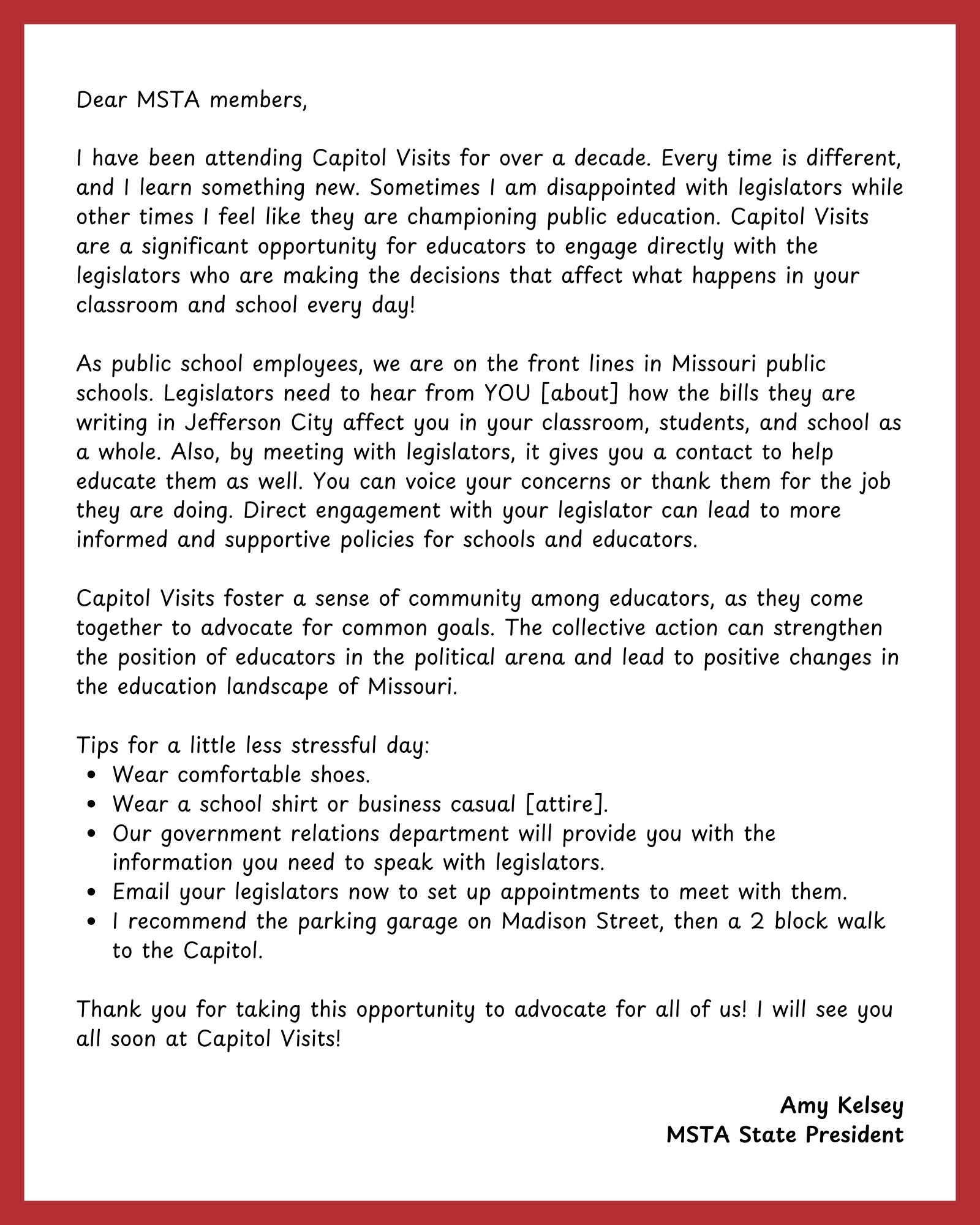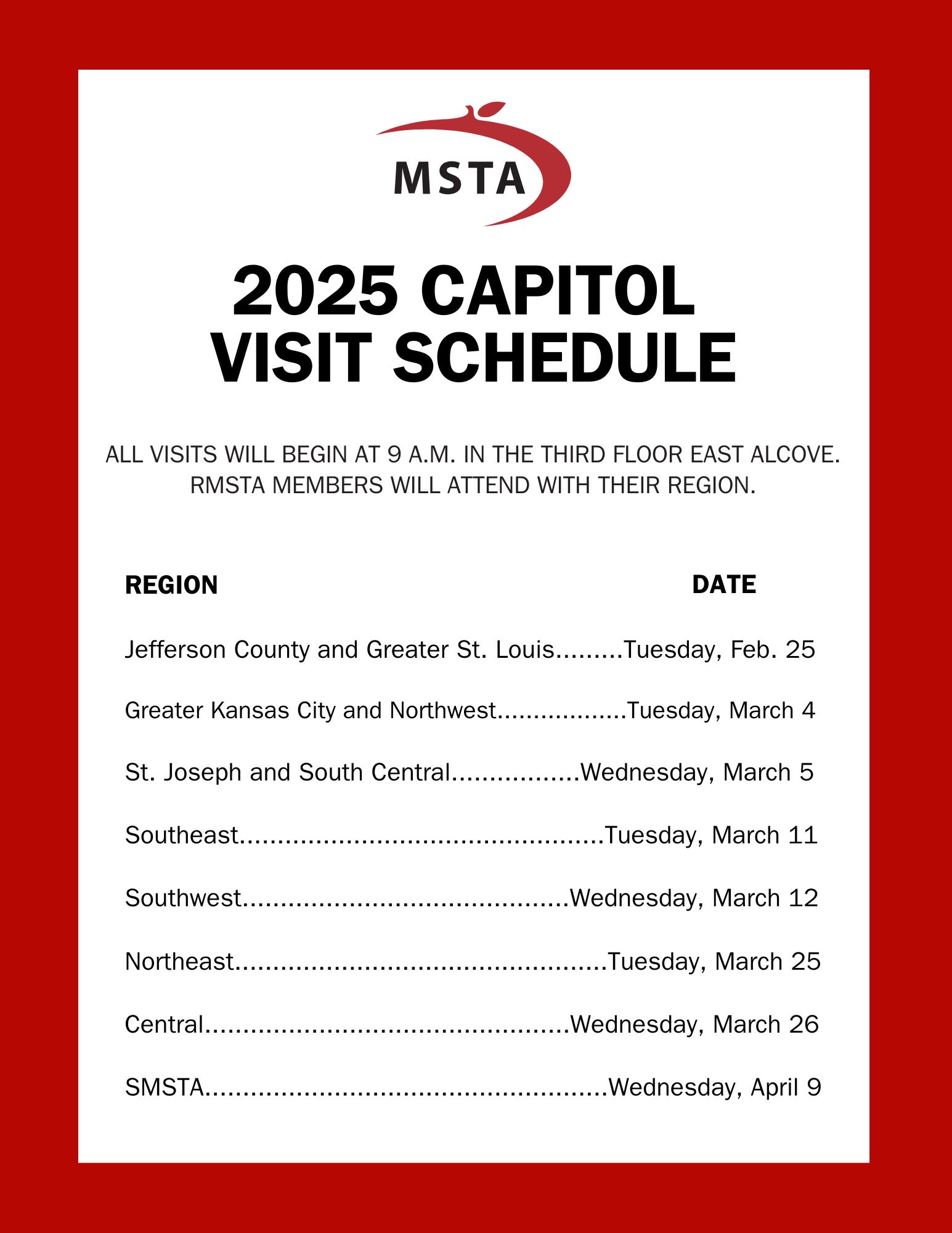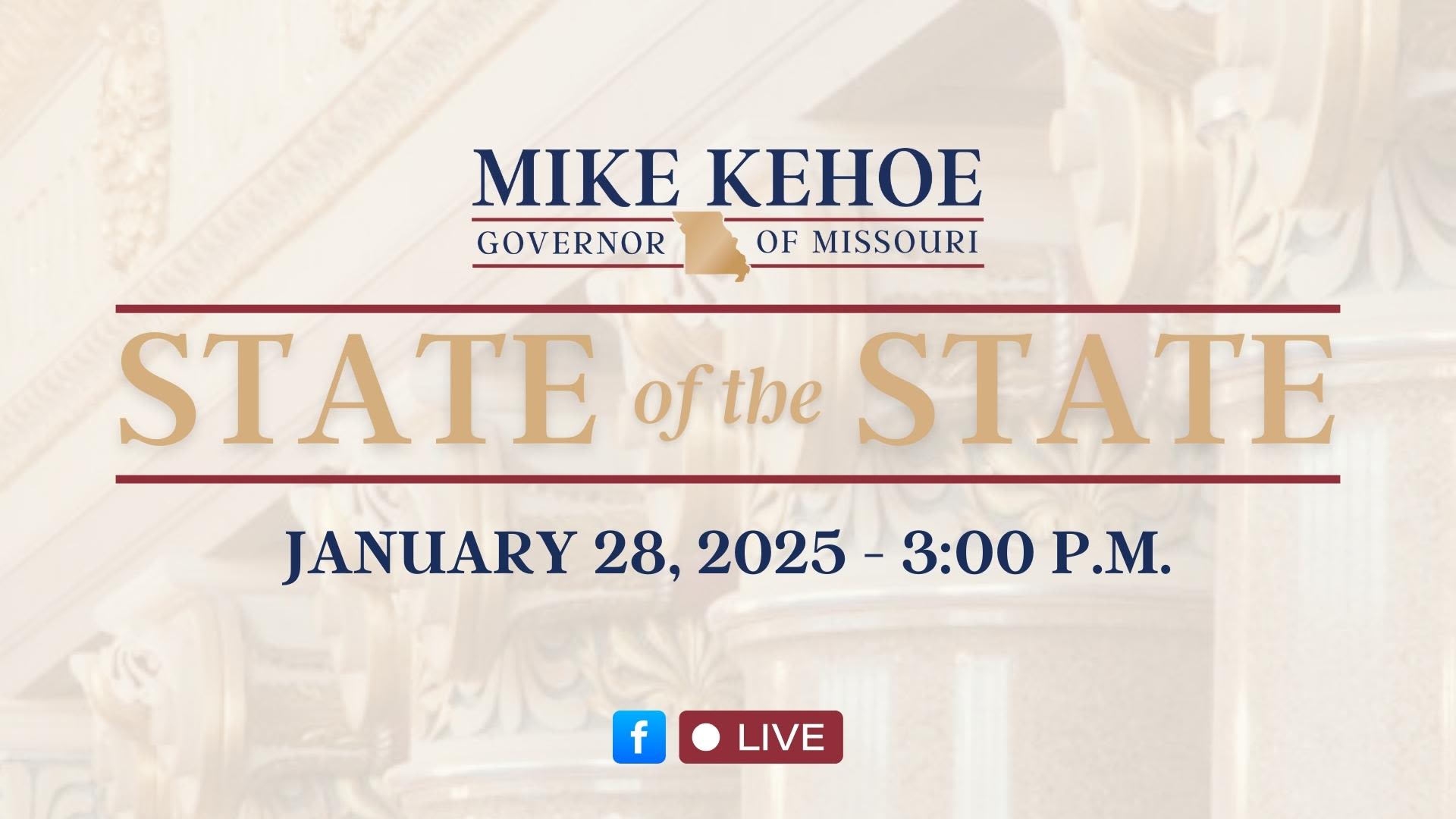The legislative newsletter of the Missouri State Teachers Association
MSTA Action: Jan. 24, 2025

In this week's Action:
- The importance of Capitol Visits-a message from MSTA State President Amy Kelsey
- Gov. Mike Kehoe to deliver State of the State Address
- DESE budget requests
- Missouri's Consensus Revenue Estimate
- House Elementary and Secondary Education Committee holds its first meeting
- Committee Assignments
- Education Policy Priorities
MSTA Digital Media Specialist Morgan Buresh outlines this week's Action in 60 seconds.
Listen to this week's Action as a podcast
We know life can be busy. That's why we've used Podera to create an AI-generated podcast that includes all of the information found in this week's Action.
Press play to give it a listen, or keep scrolling to read Action for yourself.
The importance of Capitol Visits-a message from MSTA State President Amy Kelsey
-
-
MSTA State President Amy Kelsey
MSTA State President Amy Kelsey
Plan your Capitol Visit
Each MSTA region holds a Capitol Visit each year during the legislative session. These visits give members the chance to share their experiences with decision-makers in Jefferson City.
Register for your Capitol Visit here.
What to do 1-2 months prior to your visit: Ask permission from your school administration to attend your assigned Capitol Visit as a PD opportunity. It is also a good idea to schedule a meeting with your legislator prior to your visit.
What to do 1-2 weeks prior to your visit: Gather input from your fellow MSTA members and school administration about issues impacting your district. Have positive stories to share about your district, too.
What to wear: Business casual attire is appropriate. It is also encouraged to wear a shirt showcasing your district and comfortable shoes.
Where to go: Use the front entrance at the State Capitol in Jefferson City. Everyone will meet in the third-floor rotunda East Alcove at 9 a.m. on the day of the visit.
What to say: Introduce yourself and your group members to your legislator. Highlight programs and address concerns regarding your district and profession.
Gov. Mike Kehoe to deliver State of the State Address next week
As prescribed in the Missouri Constitution, the governor is required each year to “give to the general assembly information as to the state of the government, and shall recommend to its consideration such measures as he shall deem necessary and expedient.” In practice, this is the annual State of the State Address.
Gov. Mike Kehoe will deliver his first State of the State Address on Tuesday, Jan. 28 at 3 p.m. in the House chamber before a Joint Meeting of the Missouri General Assembly. Governors utilize the State of the State Address to outline their priorities for their term in office and what they would like to see the legislature focus on throughout the session. Kehoe has already addressed several subjects that he will focus on during his term in office, including public safety and economic development. It is very likely that he will provide more clarity on what the policies he supports will look like in order to accomplish his stated goals of making Missouri safe and prosperous.
Anyone interested in viewing the 2025 State of the State Address on Tuesday can watch it on the State’s website or Facebook page.
Kehoe has also indicated that he will release his proposed Fiscal Year 2026 state budget upon the conclusion of his speech. Fiscal Year 2026 will begin on July 1, 2025, and conclude on June 30th, 2026. The governor’s proposed budget provides a glimpse into what the priorities for the administration will be over the next several years.
There will be a full breakdown of Kehoe's State of the State Address in next week’s MSTA Action.
Photo courtesy of Gov. Mike Kehoe's office
Photo courtesy of Gov. Mike Kehoe's office
Gov. Mike Kehoe was sworn in as Missouri's 58th governor on Jan. 13 in front of the Missouri Capitol. Photo courtesy of Gov. Mike Kehoe's office
Gov. Mike Kehoe was sworn in as Missouri's 58th governor on Jan. 13 in front of the Missouri Capitol. Photo courtesy of Gov. Mike Kehoe's office
DESE Budget Requests
The State Board of Education approved the Department of Elementary and Secondary Education’s (DESE) Fiscal Year 2026 budget request in September. This request is the baseline that will help the governor and the legislature build their K-12 education budget. As a reminder, the DESE budget request is just the first step in the budget process. Gov. Mike Kehoe will detail his priorities for the 2025 legislative session, including the release of his budget requests to the legislature, next week at the State of the State Address.
Below is a list of key budgetary items from the DESE budget request that MSTA will be watching to see if Kehoe agrees with or not. Many of these items are the result of the passage of SB727 (2024).
Foundation Formula Increase
- A $497 million allocation will raise the State Adequacy Target (SAT) from $6,760 to $7,145. This includes provisions under SB727, such as incentives for a five-day school week, virtual school attendance, and expanded pre-K funding from 4% to 8%.
Support for Small Schools
- An increase from $15 million to $30 million will strengthen resources for small districts, ensuring equitable distribution of funds based on attendance and local tax efforts.
Teacher Compensation and Development
- Baseline Salary Program: $5.8 million will support raising minimum teacher salaries to $40,000 and raising salaries for experienced, master’s level teachers to $46,000.
- Recruitment and Retention Scholarships: Funding for teacher scholarships will triple to $2.4 million, supporting up to 400 educators.
- Professional Development: $2 million will sustain the Missouri Leadership Development System and $1.6 million will go to the Missouri Teacher Development System, offering structured growth opportunities for educators.
Early Childhood and Special Education
- Child Care Subsidies: Over $140 million will replace expiring federal funds and transition to paying subsidies based on authorized, not actual, attendance.
- Special Education: $20.8 million will address increased caseloads and ensure adequate reimbursement for services.
Literacy and Competency-Based Education
- Elementary Literacy Program: $5 million in grants will support home reading initiatives for K-5 students.
- Literacy Coaches: $5.3 million will expand the training and support of educators through evidence-based literacy programs.
- Competency-Based Education: $3 million will fund innovative assessments and engage the community in competency-based strategies.
Infrastructure and Transportation
- A $15.2 million boost will ensure school transportation reimbursements meet the 75% threshold.
- Additional funding will modernize the Statewide Longitudinal Data System, enhancing data quality and accessibility.
Missouri's Consensus Review Estimate
Staying informed about state funding mechanisms is essential for educators advocating for the resources that Missouri schools need. This month, we explore Missouri’s Consensus Revenue Estimate (CRE), a pivotal element in determining the state’s overall funding landscape.
The CRE is Missouri’s projection of the total revenue available for the upcoming fiscal year. It serves as a foundational tool for the state to plan and allocate funds across various sectors, including education, healthcare, infrastructure, and public safety. The CRE helps ensure state expenditures align with expected revenues by providing a comprehensive forecast.
The CRE is developed through a collaborative process involving state officials, legislators, economists, and other key stakeholders. Several factors influence the estimate, including:
- Economic Forecasts: Predictions about the state’s economic performance, such as GDP growth, unemployment rates, and inflation, which impact tax revenues and other income sources.
- Legislative Changes: New laws or amendments that affect revenue streams or expenditures, including tax policy adjustments and budgetary reforms.
- Revenue Sources: Analysis of various revenue streams, including state taxes, federal funds, and other income, to project total available funds.
- Expenditure Requirements: Assessment of the state’s spending needs across different departments and services to ensure balanced budgeting.
A higher CRE can lead to increased investments across public sectors, while a lower estimate may necessitate budget cuts and reallocation of resources. Accurate forecasting is crucial to prevent budget shortfalls or surpluses, ensuring the state can meet its financial obligations and strategic priorities.
While the CRE encompasses all state funding, its impact on public education is particularly significant. Education is a major component of the state budget, and fluctuations in the CRE directly affect funding for schools, teachers, and educational programs. Adequate funding ensures public schools can maintain quality education, invest in necessary resources, and support student success.
House Elementary and Secondary Education Committee holds its first meeting
Two bills were presented this week in the House Elementary and Secondary Education Committee under new Chair Rep. Ed Lewis, from Moberly. Both pieces of legislation had been filed and discussed in past sessions, and each sponsor indicated that they understand there is still work that must be done to their bills for them to advance through the legislative process this year.
HB371 (Pollitt) would create a new additional classification of student achievement that would be used alongside current metrics. Bill sponsor Rep. Brad Pollitt, from Sedalia, described that the current performance indicators of advanced, proficient, basic, and below basic can be difficult for stakeholders to understand and that a clearly labeled grade-level equivalence would enable parents and policymakers to truly understand where students are at when it comes to their achievement.
HB477 (Oehlerking) would make changes to the individualized education program (IEP) process for students and families and would require public schools to implement parental consent procedures. Written parental consent must be obtained and maintained for initial placement, placement changes, or other revisions to a student's IEP. If the parents and local educational agency only reach an agreement on certain IEP services or interim placement, the child's new IEP will only be implemented in the areas of agreement, with the current services remaining unchanged unless the local district follows certain procedures including a due process complaint and hearing. The bill would give parents the right to visit any program proposed for their child. The bill would prohibit districts from implementing an IEP if the parents don’t complete a parental consent form.
Committee Assignments
One of the first things that both chambers must do each year at the start of the legislative session is make committee assignments for all members in each chamber. The committee assignments are made by the leaders of each party in their respective chambers. Most K-12 education-related bills will go through the House Elementary and Secondary Education Committee on the House side, and the Senate Education Committee on the Senate side. Other important committees that often see education bills and the committees that shape the budget and determine funding levels for K-12 education are listed below:
House Committees
Elementary and Secondary Education
- Rep. Ed Lewis, Republican, Chair
- Rep. Brad Banderman, Republican, Vice Chair
- Rep. Kathy Steinhoff, Democrat, Ranking Minority Member
- Rep. Ben Baker, Republican
- Rep. Stephanie Boykin, Democrat
- Rep. Mark Boyko, Democrat
- Rep. Tricia Byrnes, Republican
- Rep. Jamie Gragg, Republican
- Rep. John Hewkin, Republican
- Rep. Josh Hurlbert, Republican
- Rep. Martin Jacobs, Democrat
- Rep. Ann Kelley, Republican
- Rep. Becky Laubinger, Republican
- Rep. Cathy Jo Loy, Republican
- Rep. Ian Mackey, Democrat
- Rep. John Martin, Republican
- Rep. Mark Meirath, Republican
- Rep. Matthew Overcast, Republican
- Rep. Brad Pollitt, Republican
- Rep. Melissa Schmidt, Republican
- Rep. Kem Smith, Democrat
- Rep. Connie Steinmetz, Democrat
- Rep. Cecelie Williams, Republican
Pensions
- Rep. Ken Waller, Republican, Chair
- Rep. Barry Hovis, Republican, Vice-Chair
- Rep. Doug Clemens, Democrat, Ranking Minority Member
- Rep. Bill Allen, Republican
- Rep. Bob Bromley, Republican
- Rep. Willard Haley, Republican
- Rep. Martin Jacobs, Democrat
- Rep. Ann Kelley, Republican
- Rep. Mike McGirl, Republican
- Rep. Bill Owen, Republican
- Rep. Rodger Reedy, Republican
- Rep. Renee Reuter, Republican
- Rep. Kem Smith, Democrat
- Rep. Kathy Steinhoff, Democrat
- Rep. Connie Steinmetz, Democrat
- Rep. Dean Van Schoiack, Republican
Subcommittee on Appropriations-Education
- Rep. Bishop Davidson, Republican, Chair
- Rep. Ed Lewis, Republican, Vice-Chair
- Rep. Kathy Steinhoff, Democrat , Ranking Minority Member
- Rep. Darin Chappell, Republican
- Rep. Mazzie Christensen, Republican
- Rep. John Martin, Republican
- Rep. Raychel Proudie, Democrat
Senate Committees
Education
- Sen. Rick Brattin, Republican, Chair
- Sen, Brad Hudson, Republican, Vice-Chair
- Sen. David Gregory, Republican
- Sen. Mike Henderson, Republican
- Sen. Maggie Nurrenbern, Democrat
- Sen. Nick Schroer, Republican
- Sen. Stephen Webber, Democrat
Appropriations
- Sen. Lincoln Hough, Republican, Chair
- Sen. Rusty Black, Republican, Vice-Chair
- Sen. Jason Bean, Republican
- Sen. Justin Brown, Republican
- Sen. Mike Cierpiot, Republican
- Sen. Sandy Crawford, Republican
- Sen. Travis Fitzwater, Republican
- Sen. Mike Henderson, Republican
- Sen. Brad Hudson, Republican
- Sen. Karla May, Democrat
- Sen. Maggie Nurrenbern, Democrat
- Sen. Barbara Washington, Democrat
- Sen. Brian Williams, Democrat
Local Government, Elections, and Pensions
- Sen. Rusty Black, Republican, Chair
- Sen. Mike Henderson, Republican, Vice-Chair
- Sen. Doug Beck, Democrat
- Sen. Rick Brattin, Republican
- Sen. Jamie Burger, Republican
- Sen. Sandy Crawford, Republican
- Sen. Joe Nicola, Republican
- Sen. Maggie Nurrenbern, Democrat









